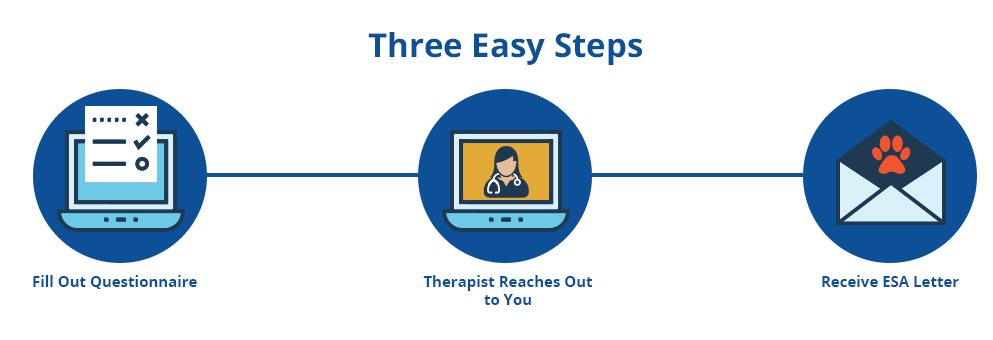What to Know About Emotional Support Animals

Want a pet with special housing rights that can help with your anxiety, depression, or other mental health challenges? That’s exactly what emotional support animals do. Unlike trained service dogs, emotional support animals are regular pets — your dog, who gives you a reason to get out of bed when depression hits hard, or your cat, who helps you through panic attacks. The only thing that makes them an “official” support pet is an ESA letter from a licensed mental health professional.
With this letter, you have legal rights to keep your emotional support animal in your home, even in “no pets” housing, without paying extra fees or deposits. Read on to learn everything there is to know about ESAs.
In this article:
- Qualifications for an emotional support animal
- Animals that are allowed to be ESAs
- Your ESA legal rights (and where they end)
- Laws that protect emotional support animals
- When you have more than one ESA
- ESA certificates, registrations, vests, and ID cards
- The real benefits of having an ESA
Qualifications for an Emotional Support Animal
The process isn’t complicated, but there’s a right way to qualify for an emotional support animal. You’ll need a mental health professional who can write an ESA letter to confirm that you have a condition that qualifies, like the following:
- anxiety
- depression
- PTSD
- ADHD
- autism
They’ll also need to verify that having an animal genuinely helps you manage your symptoms.
Once you’ve found a licensed mental health professional, they can write you an ESA letter. The process is the same, no matter whether you have an emotional support cat or are trying to get a letter for an emotional support dog. Once you have an ESA letter, the next step is to tell your landlord about your emotional support animal and give them a copy.
Animals That Are Allowed to Be ESAs
Emotional support dogs are probably the most common choice, and emotional support cats are the second most common, but don’t overlook other types of animals that can also be perfect ESAs.
These are the most common emotional support animals:
- dogs
- cats
- birds
- rabbits
- guinea pigs
- fish
- turtles
Birds can be wonderful emotional support animals. For example, parakeets and cockatiels are social and interactive, and can form strong bonds with their owners. Small mammals, such as rabbits and guinea pigs, work well in apartments and can provide calming comfort through petting and interaction. Even fish can be effective ESAs. Watching them swim can be meditative and calming. Plus, they provide structure through their care routine without needing the intensive attention other pets might require.
Remember that exotic animals typically can’t be ESAs. This means no snakes, ferrets, or sugar gliders. The animal needs to be one commonly kept as a household pet. Also, while you might love horses or miniature ponies, they usually can’t be ESAs because they’re not typically kept in homes.
As for training, emotional support animals don’t need any special certification or training program. Unlike service dogs, which require extensive training for specific tasks, ESAs just need to be well-behaved pets. This means:
- Being house-trained
- Not being aggressive toward people or other animals
- Not causing property damage
- Being under control in shared spaces
- Not creating noise that disturbs neighbors
Your ESA should help your mental health without causing problems for others. For example, if your cat’s purring helps calm your anxiety, great! If your rabbit gives you a reason to get up and maintain a routine, it’s perfect. If your parakeet provides companionship that helps with depression, that works too. The support can be as simple as their presence, making you feel better.
Your ESA Legal Rights (And Where They End)
You can live with your emotional support animal in most housing situations, even if there’s a no-pet policy. These are your rights as the owner of an ESA:
- Exemption from no-pet housing
- Waived monthly pet fees
- Waived pet deposits
- No breed restrictions
- No size limits
But let’s be clear about where these rights end. Emotional support animals are different from service dogs. Your ESA doesn’t have the right to go everywhere with you like a psychiatric service dog does. Restaurants, stores, and other public places can still say no to ESAs. Airlines no longer have to accommodate them either. This is different from service dogs, which have much broader access rights.
Laws That Protect Emotional Support Animals
Understanding your legal rights with an ESA starts with knowing which laws protect you. Unlike service animals, which are covered by the Americans with Disabilities Act (ADA), emotional support animals are protected primarily by housing laws.
The Fair Housing Act is the most important law for ESA owners. HUD’s federal housing rules require landlords and housing providers to make “reasonable accommodations” for emotional support animals, even in buildings with no-pet policies. Under the FHA, your landlord must let you live with your ESA even if they have a no-pets policy. They can’t deny your ESA because of breed restrictions or size limits, and they aren’t allowed to charge pet deposits or extra fees for your ESA.
As of 2021, airlines are no longer required to accommodate emotional support animals in the cabin due to changes in the Air Carrier Access Act (ACAA). While you can still fly with a service dog, ESAs are now treated as regular pets when it comes to air travel.

When You Have More Than One ESA
Sometimes, one emotional support animal isn’t enough, and that’s okay. You can have two or more emotional support animals if your mental health provider agrees that each one helps you in a specific way. Maybe your dog motivates you to exercise and socialize, while your cat helps calm your anxiety at home. Just make sure each animal is included in your ESA documentation.
ESA Certificates, Registrations, Vests, and ID Cards
Let’s cut through the confusion about ESA identification items. First, the most important thing to understand is that your ESA letter is the only legally required documentation. You don’t need a certificate or registration. Accessories like ESA ID cards, tags, or harnesses are also not mandatory, and anyone telling you otherwise is trying to sell you something you don’t legally need.
That said, many ESA owners choose to use these items, and there are some practical reasons why we offer them for sale.
A vest can make public interactions smoother by clearly identifying your animal as an ESA. This can be especially helpful in apartment common areas in no-pet buildings where other tenants or staff might be confused by why an animal is present. However, remember that wearing a vest doesn’t grant your ESA any additional access rights to public spaces.
Some people find it convenient to have a quick way to show their animal’s ESA status without pulling out the full letter. A simple ID tag or card can help in casual interactions. These can also be useful in emergency situations where first responders or emergency housing staff need to quickly understand your animal’s status.
Just remember that even with these items, ESA rights and limitations remain the same. Your legal protections come from your ESA letter, not from any vest, tag, or ID card.
The Real Benefits of Having an ESA
The research backs up what many people already know from experience: emotional support animals provide mental health benefits. ESAs can help reduce anxiety, improve mood, and provide structure to your day. They give you someone to care for when self-care is hard, and they can make social situations feel less overwhelming.
ESAs don’t just provide direct emotional support, they can also help improve your social life. Walking a dog often leads to conversations with other pet owners. Even caring for a rabbit or bird can give you something to talk about with others who share your interests. This gentle push toward social interaction can be especially valuable if you struggle with social anxiety or isolation.

Get Your Legitimate ESA Letter
About the Author: The writing team at Service Dog Certifications is made up of folks who really know their stuff when it comes to disability laws and assistance animals. Many of our writers and editors have service dogs themselves and share insights from their own experiences. All of us have a passion for disability rights and animals.
Related Articles

How to Qualify for An Emotional Support Animal
To qualify for an emotional support animal under the Fair Housing Act, you need to follow these three steps: The most important step is getting an ESA letter that meets HUD’s housing rules for emotional support animals. Make sure your ESA letter has the following: You should also ensure that your ESA letter is not […]

Read More

How to Get an Emotional Support Dog Letter
To make your dog your official emotional support animal, you need a signed ESA letter from a healthcare professional. That might sound like a lot of work at first, but getting an emotional support dog letter really just involves three easy steps: Let’s break down each of these steps so you know exactly what to […]

Read More

What to Do if Your Landlord Does Not Accept Your Emotional Support Animal
If your landlord has said no to your emotional support animal, there’s no need to panic; HUD’s rules are on your side. In this article we’ll let you know what you need to do and provide templates for you to smooth communications with your landlord. In this article: Keep in mind that most but not […]

Read More
As a disabled Veteran, homeless and coping with physical and mental shortcomings am so grateful for my E.S.A., whom is named Chika.
Collectively we overcome our daily struggles.
I would like to thank you and this and other organizations whom validate the value and importance of Chika and other selected E.S.A.
For they’re contribution towards the health and welfare of individuals faced with unfortunate circumstaces benefiting from these pets.
Thank you for your service and thank you for sharing your story.
This was an extremely helpful article and it’s much appreciated that it is factual and relevant information, especially given the amount of misinformation and salesmanship employed by many other sources.
Thank you!
Thank you for the amazing compliment!
You say “However, remember that wearing a vest doesn’t grant your ESA any additional access rights to public spaces.” So does that mean if I have an letter saying my two dogs are my emotional support, I am not allowed to bring them to my office?
No, for clarification, ESAs don’t have rights outside of housing. They don’t have public access rights or workplace access rights the same way that service dogs do.